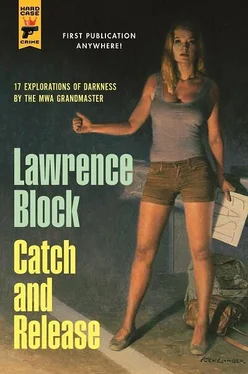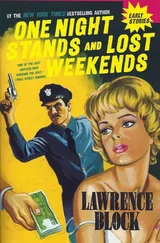When he got out of the service, young Fielding wrote a few more stories, but he found the business discouraging. There were, he had come to realize, too many people who wanted to be writers. Sometimes it seemed as though everybody wanted to be a writer, including people who could barely read. And when they tried their hand at it, they almost always thought it was good.
Was such monumental self-delusion as easy in other areas of human endeavor? I think not. Every boy wants to be a professional baseball player, but an inability to hit a curveball generally disabuses a person of the fantasy. Untalented artists, trying to draw something, can look at it and see that it didn’t come out as they intended. Singers squawk, hear themselves, and find something else to do. But writers write, and look at what they have written, and wonder what’s keeping the Nobel Commission fellows from ringing them up.
You shake your heads at this, and call it folly. Byron Fielding called it opportunity, and opened his arms wide.
He set up shop as a literary agent; he would represent authors, placing their work with publishers, overseeing the details of their contracts, and taking ten percent of their earnings for his troubles. This was nothing new; there were quite a few people earning their livings in this fashion — though not a fraction of the number there are today. But how, one wondered, could Byron Fielding hope to establish himself as an agent? He had no contacts. He didn’t know any writers — or publishers, or anyone else. What would persuade an established writer to do business with him?
In point of fact, Fielding had no particular interest in established writers, realizing that he had little to offer them. What he wanted was the wannabes, the hopeful hopeless scribblers looking for the one break that would transform a drawer full of form rejection slips into a life of wealth and fame. He rented office space, called himself Byron Fielding, called his company the Byron Fielding Literary Agency, and ran ads in magazines catering to the same hopeful hopeless ones he was counting on to make him rich. “I sell fiction and non-fiction to America’s top markets,” he announced. “I’d like to sell them your material.” And he explained his terms. If you were a professional writer, with several sales to national publishers to your credit, he would represent you at the standard terms of 10 % commission. If you were a beginner, he was forced to charge you a reading fee of $1 per thousand words, with a minimum of $5 and a maximum of $25 for book-length manuscripts. If your material was salable, he would rush it out to market on his usual terms. If it could be revised, he’d tell you how to fix it — and not charge you an extra dime for the advice. And if, sadly, it was unsalable, he’d tell you just what was wrong with it, and how to avoid such errors in the future.
The money rolled in.
And so did the stories, and they were terrible. Fielding stacked them, and when each had been in his office for two weeks, so that it would look as though he’d taken his time and given it a careful reading, he returned it with a letter explaining just what was wrong with it. Most of the time what was wrong was the writer’s utter lack of talent, but he never said that. Instead he praised the style and found fault with the plot, which somehow was always flawed in ways that revision could not cure. Put this one away, he advised each author, and write another, and send that along as soon as it’s finished. With, of course, another reading fee.
The business was profitable from the beginning, with writers incredibly sending in story after story, failing entirely to learn from experience. Fielding thought he’d milk it for as long as it lasted, but a strange thing happened. Skimming through the garbage, he found himself coming across a story now and then that wasn’t too bad. “Congratulations!” he wrote the author. “I’m taking this right out to market.” It was probably a mistake, he thought, but this way at least he got away with a shorter letter.
And some of the stories sold. And, out of the blue, a professional writer got in touch, wondering if Fielding would represent him on a straight commission basis. By the time my patient, young Gerald Metzner, went to work for him, Byron Fielding was an established agent with over ten years in the business and a string of professional clients whose work he sold to established book and magazine publishers throughout the world.
Fielding had half a dozen people working for him by then. One ran a writing school, with a post office box for an address and no visible connection with Byron Fielding or his agency. The lucky student worked his way through a ten-lesson correspondence course, and upon graduating received a certificate of completion and the suggestion that he might submit his work (with a reading fee) to guess who. Another employee dealt with the professional clients, working up market lists for the material they submitted. Two others — Gerald Metzner was one of them — read the scripts that came in over the transom, the ones accompanied by reading fees. “I can see you are no stranger to your typewriter,” he would write to some poor devil who couldn’t write an intelligible laundry list. “Although this story has flaws that render it unsalable, I’ll be eager to see your next effort. I feel confident that you’re on your way.” The letter, needless to say, went out over Byron Fielding’s signature. As far as the mopes were concerned, Fielding was reading every word himself, and writing every word of his replies. Another employee, also writing over Fielding’s mean little scrawl, engaged in personal collaboration with the more desperate clients. For a hundred bucks, the great man himself would purportedly work with them step-by-step, from outline through first draft to final polish. They would be writing their stories hand in hand with Byron Fielding, and when it was finished to his satisfaction he would take it out to market.
The client (or victim, as you prefer) would mail in his money and his outline. The hireling, who had very likely never sold anything himself, and might in fact not ever have written anything, would suggest some arbitrary change. The client would send in the revised outline, and when it was approved he would furnish a first draft. Again the employee would suggest improvements, and again the poor bastard would do as instructed, whereupon he’d be told that the story, a solid professional effort, was on its way to market.
But it remained a sow’s ear, however artfully embroidered, and Fielding wouldn’t have dreamed of sullying what little reputation he had by showing such tripe to an editor. So the manuscript went into a drawer in the office, and there it remained, while the hapless scribbler was encouraged to get cracking on another story.
The fee business was ethically and morally offensive, and one wondered why Fielding didn’t give it up once he could afford to. The personal collaboration racket was worse; it was actionably fraudulent, and a client who learned what was going on could clearly have pressed criminal charges against his conniving collaborator. It’s not terribly likely that Fielding could have gone to jail for it, but a determined prosecutor with the wind up could have given him some bad moments. And if there were a writer or two on the jury, he couldn’t expect much in the way of mercy.
Fielding hung on to it because he didn’t want to give up a dime. He didn’t treat his professional clients a great deal better, for in a sense he had only one client, and that client was Byron Fielding. He acted, not in his clients’ interests, but in his own. If they coincided, fine. If not, tough.
I could go on, but you get the idea. So did young Metzner, and he wasn’t there for long. He worked for Fielding for a year and a half, then resigned to do his own writing. A lot of the agency’s pro clients were writing soft-core paperback fiction, and Metzner tried one of his own. When it was done he sent it to Fielding, who sold it for him.
Читать дальше








